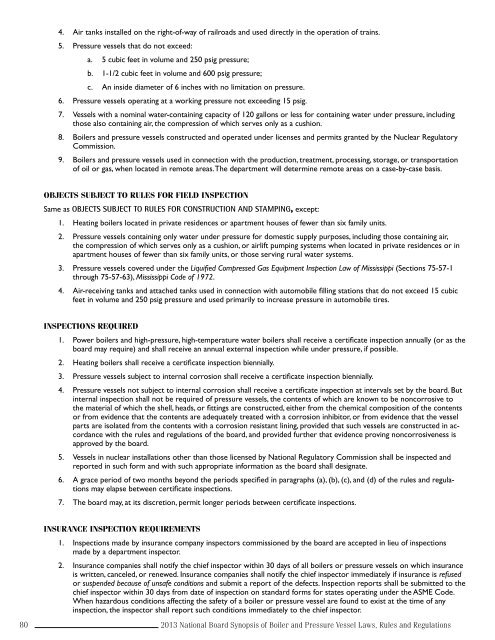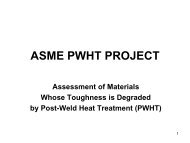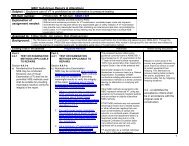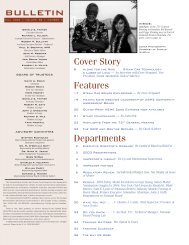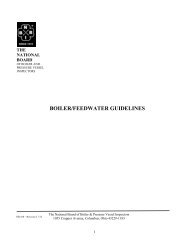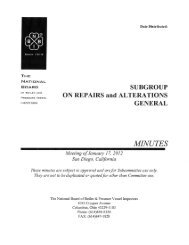Laws, Rules and Regulations - The National Board of Boiler and ...
Laws, Rules and Regulations - The National Board of Boiler and ...
Laws, Rules and Regulations - The National Board of Boiler and ...
You also want an ePaper? Increase the reach of your titles
YUMPU automatically turns print PDFs into web optimized ePapers that Google loves.
80<br />
4. Air tanks installed on the right-<strong>of</strong>-way <strong>of</strong> railroads <strong>and</strong> used directly in the operation <strong>of</strong> trains.<br />
5. Pressure vessels that do not exceed:<br />
a. 5 cubic feet in volume <strong>and</strong> 250 psig pressure;<br />
b. 1-1/2 cubic feet in volume <strong>and</strong> 600 psig pressure;<br />
c. An inside diameter <strong>of</strong> 6 inches with no limitation on pressure.<br />
6. Pressure vessels operating at a working pressure not exceeding 15 psig.<br />
7. Vessels with a nominal water-containing capacity <strong>of</strong> 120 gallons or less for containing water under pressure, including<br />
those also containing air, the compression <strong>of</strong> which serves only as a cushion.<br />
8. <strong>Boiler</strong>s <strong>and</strong> pressure vessels constructed <strong>and</strong> operated under licenses <strong>and</strong> permits granted by the Nuclear Regulatory<br />
Commission.<br />
9. <strong>Boiler</strong>s <strong>and</strong> pressure vessels used in connection with the production, treatment, processing, storage, or transportation<br />
<strong>of</strong> oil or gas, when located in remote areas. <strong>The</strong> department will determine remote areas on a case-by-case basis.<br />
ObJeCtS SUbJeCt tO rUleS FOr FIelD InSpeCtIOn<br />
Same as OBJECTS SUBJECT TO RULES FOR CONSTRUCTION AND STAMPING, except:<br />
1. Heating boilers located in private residences or apartment houses <strong>of</strong> fewer than six family units.<br />
2. Pressure vessels containing only water under pressure for domestic supply purposes, including those containing air,<br />
the compression <strong>of</strong> which serves only as a cushion, or airlift pumping systems when located in private residences or in<br />
apartment houses <strong>of</strong> fewer than six family units, or those serving rural water systems.<br />
3. Pressure vessels covered under the Liquified Compressed Gas Equipment Inspection Law <strong>of</strong> Mississippi (Sections 75-57-1<br />
through 75-57-63), Mississippi Code <strong>of</strong> 1972.<br />
4. Air-receiving tanks <strong>and</strong> attached tanks used in connection with automobile filling stations that do not exceed 15 cubic<br />
feet in volume <strong>and</strong> 250 psig pressure <strong>and</strong> used primarily to increase pressure in automobile tires.<br />
InSpeCtIOnS reQUIreD<br />
1. Power boilers <strong>and</strong> high-pressure, high-temperature water boilers shall receive a certificate inspection annually (or as the<br />
board may require) <strong>and</strong> shall receive an annual external inspection while under pressure, if possible.<br />
2. Heating boilers shall receive a certificate inspection biennially.<br />
3. Pressure vessels subject to internal corrosion shall receive a certificate inspection biennially.<br />
4. Pressure vessels not subject to internal corrosion shall receive a certificate inspection at intervals set by the board. But<br />
internal inspection shall not be required <strong>of</strong> pressure vessels, the contents <strong>of</strong> which are known to be noncorrosive to<br />
the material <strong>of</strong> which the shell, heads, or fittings are constructed, either from the chemical composition <strong>of</strong> the contents<br />
or from evidence that the contents are adequately treated with a corrosion inhibitor, or from evidence that the vessel<br />
parts are isolated from the contents with a corrosion resistant lining, provided that such vessels are constructed in accordance<br />
with the rules <strong>and</strong> regulations <strong>of</strong> the board, <strong>and</strong> provided further that evidence proving noncorrosiveness is<br />
approved by the board.<br />
5. Vessels in nuclear installations other than those licensed by <strong>National</strong> Regulatory Commission shall be inspected <strong>and</strong><br />
reported in such form <strong>and</strong> with such appropriate information as the board shall designate.<br />
6. A grace period <strong>of</strong> two months beyond the periods specified in paragraphs (a), (b), (c), <strong>and</strong> (d) <strong>of</strong> the rules <strong>and</strong> regulations<br />
may elapse between certificate inspections.<br />
7. <strong>The</strong> board may, at its discretion, permit longer periods between certificate inspections.<br />
InSUranCe InSpeCtIOn reQUIrementS<br />
1. Inspections made by insurance company inspectors commissioned by the board are accepted in lieu <strong>of</strong> inspections<br />
made by a department inspector.<br />
2. Insurance companies shall notify the chief inspector within 30 days <strong>of</strong> all boilers or pressure vessels on which insurance<br />
is written, canceled, or renewed. Insurance companies shall notify the chief inspector immediately if insurance is refused<br />
or suspended because <strong>of</strong> unsafe conditions <strong>and</strong> submit a report <strong>of</strong> the defects. Inspection reports shall be submitted to the<br />
chief inspector within 30 days from date <strong>of</strong> inspection on st<strong>and</strong>ard forms for states operating under the ASME Code.<br />
When hazardous conditions affecting the safety <strong>of</strong> a boiler or pressure vessel are found to exist at the time <strong>of</strong> any<br />
inspection, the inspector shall report such conditions immediately to the chief inspector.<br />
2013 <strong>National</strong> <strong>Board</strong> Synopsis <strong>of</strong> <strong>Boiler</strong> <strong>and</strong> Pressure Vessel <strong>Laws</strong>, <strong>Rules</strong> <strong>and</strong> <strong>Regulations</strong>


